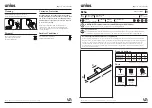
13. Place completed assembly into feeder hopper. Align cone support onto
axle assembly.
14.
Ensure feed flow control (Item 14) is set to ‘0’.
15. Remove nuts and spring.
Discard spring and two (2) nuts. These
parts are not used for Model RF1 and Model RF3 Feeders.
16.
Place feed flow control onto crossbar with back side of assembly resting
against flat side of crossbar. Install the feed flow control to crossbar with
5/16 x 7/8-in. bolt and 5/16-in. flange nut.
17.
Connect feed flow control and cone strap. Hold cone strap up and thread
nut (A) onto bolt on feed flow control. Adjust nut (A) until cone is lightly
resting on feed sweep.
18.
Tighten second nut (B) against first nut (A).
NOTE: Refer to ADJUSTMENT RECOMMENDATIONS below to set the
recommended cone height to start pigs.
19. Place bump bar agitators (Items 21) into the two middle holes on the
crossbar. Install washer and nuts (Items 22). Adjust length of bump bars
with the nut. Use pliers to hold the bump bars in place. When the wheel
is turned, the bump bars should only drag along the hopper bottom about
one-fourth of a full circle.
OPTIONAL LID INSTALLATION
20.
Install fiberglass hopper lid (Item 24) by aligning indentions in lid with
crossbar. Attach hook and spring to crossbar to secure.
ADJUSTMENT AND TRAINING RECOMMENDATIONS
To train pigs on the feeder, set feed flow control to 1 1/2 to 2 and manually turn feed wheel until feed begins to flow into trough. Manually scoop feed into the
trough and fill for first use. As first trough full is eaten, pigs learn through play that the feed wheel dispenses feed. Adjust the cone height with feed flow control
as needed. Proper adjustment will vary based upon feed grind, moisture content and animal size.
F
F
K
K
SECTION K-K
L
L
N
N
M
O
H
H
SECTION H-H
Hold cone strap up
A
I
I
B
A
Spring to discard.
Nuts to discard (2 ea.)

























